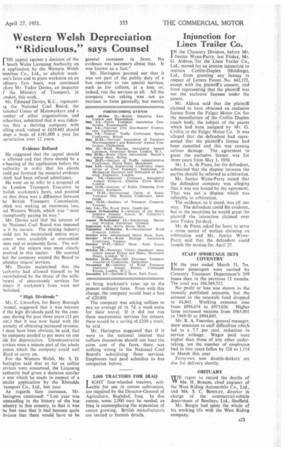Western Welsh Depreciation "Ridiculous," says Counsel
Page 25

If you've noticed an error in this article please click here to report it so we can fix it.
HE appeal against a decision of the 1 South Wales Licensing Authority on n application by the Western Welsh omnibus Co., Ltd., to abolish workien's fares and to place workmen on an rdinary fare basis, was continued efore Mr. Tudor Davies, an inspector f the Ministry of Transport, in .ondort, this week.
Mr. Edmund Davies, K.C.. representng the National Coal Board, the .lational Union of Mineworkers and a umber of other organizations and uthorities, submitted that it was ridieuaus that a thriving company with offing stock valued at £639,463 should dont a basis of £181,000 a year for epreciation over 12 years.
Evidence Refused He suggested that the appeal should allowed and that there should be a e-hearing of the application before the kuthority in order that his clients ould put forward the material evidence hich had been refused admittance. He went on to refer to a proposal of he London Transport Executive to bolish workmen's fares, and pointed lilt that there was a difference between he British Transport Commission, thich was making an enormous loss, nd Western Welsh, which was "most riumphandy paying its way."
Mr. Davies said that the interest of he National Coal Board was imposed n it by statute. The mining industry ould not be maintained unless manower were available at convenient imes and at economic fares, The welare of the miners was most clearly avolved in this matter. He asserted hat the company wanted the Board to ubsidize miners' services.
Mr. Davies maintained that the kuthority had allowed himself to be ■ verwhelmed by the threat of the withlrawal of -Uneconomic services for niners if workmen's fares were not holished.
"High Dividends" Mr. C. Llewellyn, for Barry Borough mined, suggested that it was because I the high dividends paid by the cornany during the past three years (13 per mt.) that it was now faced with the ecessity of obtaining increased revenue. t must have been obvious, he said, that he company needed to put more on one ide for depreciation. Unremunerative erviees were a minute part of the whole ystem which the company could well fford to carry on.
For the Western Welsh, Mr. S. D. Ierington said that so far as collier ervices were concerned, the Licensing kuthority had given a decision similar a one which he made in respect of a imilar application by the Rhondda -ransport Co., Ltd., last year.
As regards fare increases, Mr. ferington continued: " last year was ■ utstanding in the history of the bus ndustry in this country, in that it was he first year that it had become quite lavious that there would have to be general increases in fares, No evidence was necessary about that. It was known as a fact."
Mr. Herington pointed out that it was not part of the public duty of a bus operator to run special services, such as for colliers, at a loss, or, indeed, run the services at all. All the company was asking was not an increase in fares generally, but merely to bring workmen's rates up to the present ordinary fares. Even with this change, the company would bear a loss of £20,000.
The company was asking colliers to pay an average of Is. 7d. a week extra for their _travel. If it did not run these uneconomic services for miners, there would be a saving of 4230 a week, he said.
Mr. Herington suggested that if it were in the national interest that colliers themselves should not bear the extra cost of the fares, there was nothing wrong in the National Coal Board's subsidizing these services. Employers had paid subsidies to bus companies before.
2,000 TRACTORS FOR IRAQ IGHT four-wheeled tractors, suit.1-.+able for use in cotton cultivation, are required by the Director-General of Agriculture, Baghdad, Iraq. In due course, some 2,000 may be needed, as Iraq is contemplating the expansion of cotton growing, British manufacturers are invited to furnish details.












































































